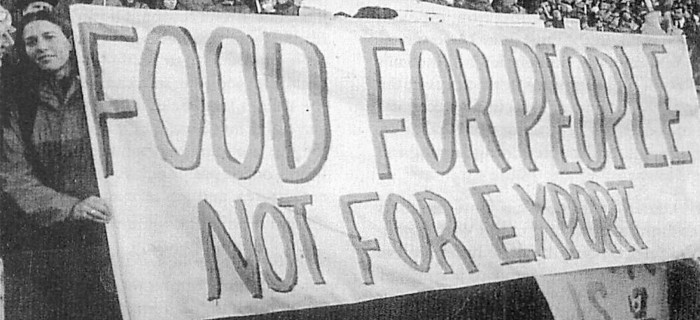Freedom to Trade? Trading Away American Family Farms
Food First Backgrounder, Fall 2001, Vol. 7, No. 4
On January 1, 1995, the World Trade Organization (WTO) was established. It is home to a series of trade accords that include agreements on services, agriculture, intellectual property rights, and other issues never before included in international trade rules. The organization was established with a commitment to raise standards of living and ensure full employment in the context of expanding trade, while upholding the objective of sustainable development. The reality has been almost the opposite.
At the last ministerial held in Seattle in 1999, negotiators were confronted by 70,000 protestors: a coalition of students, teachers, farmers, farmworkers, factory and steel workers, consumers, environmentalists, feminists, spiritual leaders, animals rights activists, human rights advocates, friends and families, and representatives from more than 100 countries. They stood together for fair labor standards, environmental protection, public health, human rights, and democratic values over the “corporate interest first” agenda of the trade talks. The meeting eventually collapsed under the weight of the protests inside and outside the conference center.
In the wake of the Seattle debacle and other protests against the international financial institutions that have gathered strength since then, the next ministerial was planned for Doha, Qatar. The built-in agenda for the WTO has several items of concern, with agriculture being one of the key areas. A communique issued following the twenty-second Ministerial held in Punta del Este, Uruguay, in September 2001, emphasized that the next ministerial should provide a clear commitment to end discrimination against agriculture and fully integrate it into WTO rules. This commitment is designed to achieve fundamental reform of agricultural trade through elimination of all forms of export subsidies and reduction of domestic support.
Farmers have lost control over food as it’s going through the chain. – Craig Hill, farmer
The US administration has been a key advocate of the Agreement on Agriculture (AOA) in the trade talks. President Bush has used agriculture as an excuse to push the vote on Trade Promotion Authority (TPA, once called fast Track) through Congress. This will allow him to negotiate international trade agreements that Congress can only approve or reject, but not amend. President Bush has argued, “I want America to feed the world. We are missing some great opportunities, not only in our hemisphere, but around the world. These are opportunities for people who earn a living the hard way… These are opportunities for working people.” In other words, trade agreements are good for American farmers.
This position has been supported by the USDA secretary Ann Veneman and former secretaries Dan Glickman and Clayton Yeutrer. Glickman claimed that “without expanding access to trade, we will see income come down. There are lots of positions on this, but there is no question that the President needs TPA … needs the authority to go out and negotiate trade deals.” Yeutter even singled out labor unions, radical environmental advocacy groups, and anti-globalization forces as the main opponents of farmers.


 Help Food First to continue growing an informed, transformative, and flourishing food movement.
Help Food First to continue growing an informed, transformative, and flourishing food movement.




